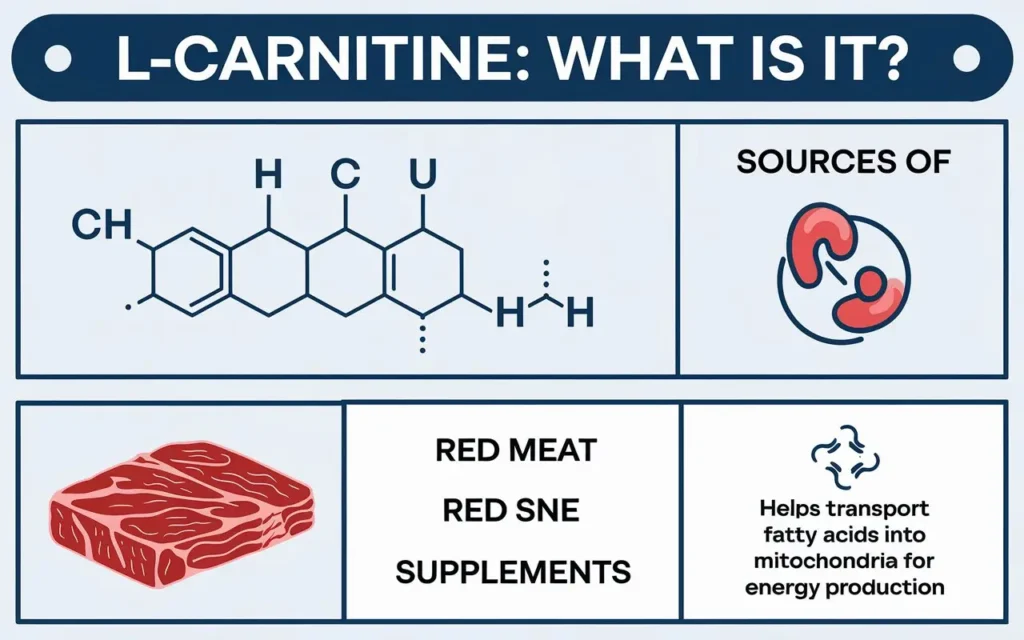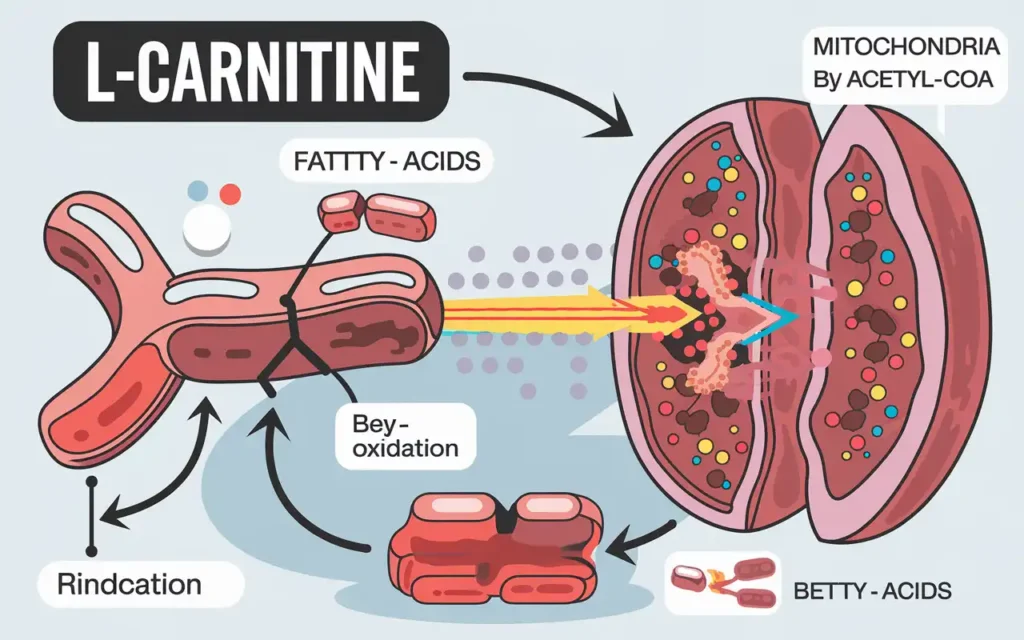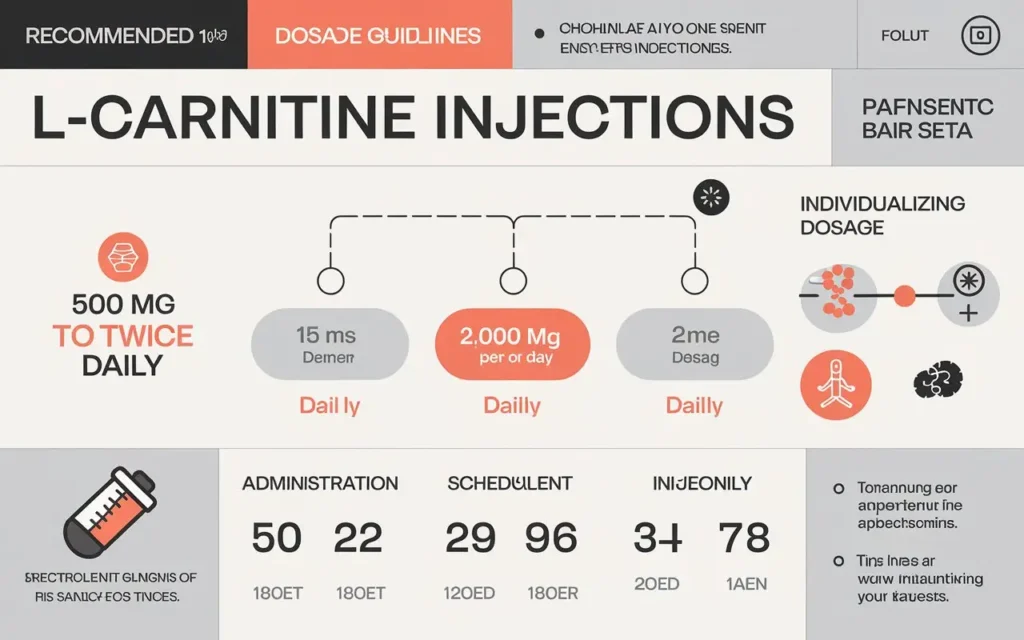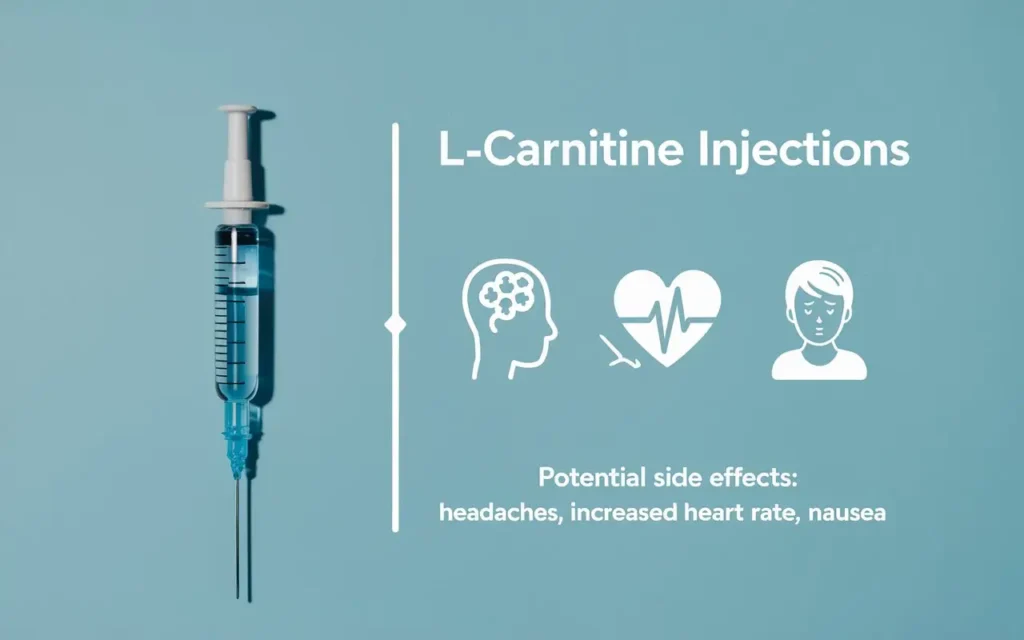L-Carnitine Injection Dosage for Weight Loss: A Comprehensive Guide
1. Introduction
L-Carnitine injection dosage for weight loss has gained popularity as a supplement strategy for those looking to shed extra pounds. This comprehensive guide explores the optimal dosages, effectiveness, safety considerations, and practical tips for integrating L-Carnitine injections into your weight loss regimen. Whether you’re a fitness enthusiast or someone struggling with weight management, understanding the role of L-Carnitine can help you make informed decisions.
In the quest for effective weight loss solutions, many turn to supplements and injections to complement their diet and exercise routines. Among these, L-Carnitine stands out due to its potential benefits in enhancing fat metabolism and boosting energy levels. This article delves deep into the specifics of L-Carnitine injection dosage for weight loss, providing you with the knowledge needed to utilize this supplement safely and effectively.
2. What is L-Carnitine?

L-Carnitine injection dosage for weight loss begins with understanding what L-Carnitine is. L-Carnitine is a naturally occurring amino acid derivative that plays a crucial role in energy production by transporting fatty acids into the mitochondria of cells, where they are burned for energy. This process is essential for maintaining energy levels and supporting metabolic functions.
2.1 Sources of L-Carnitine
- Dietary Sources: Red meat, poultry, fish, and dairy products are rich in L-Carnitine. For individuals who consume a balanced diet, the body typically produces sufficient L-Carnitine.
- Supplements and Injections: For those who may have deficiencies or are seeking enhanced weight loss benefits, L-Carnitine supplements and injections are available. These provide a more concentrated dose compared to dietary intake.
- Biosynthesis: The human body synthesizes L-Carnitine from the amino acids lysine and methionine, primarily in the liver and kidneys. This endogenous production usually meets the body’s needs unless there’s a dietary deficiency or increased demand.
2.2 Types of L-Carnitine Supplements
- L-Carnitine L-Tartrate: Commonly used in sports supplements due to its rapid absorption rate, making it effective for enhancing exercise performance.
- Acetyl-L-Carnitine: Known for its cognitive benefits, this form crosses the blood-brain barrier more effectively, supporting brain health alongside its fat metabolism properties.
- Propionyl-L-Carnitine: Often used for circulatory health, it aids in improving blood flow and has applications in treating certain heart conditions.
2.3 Mechanism of Action
L-Carnitine’s primary function is to facilitate the transport of long-chain fatty acids into the mitochondria, where they undergo beta-oxidation to produce energy. This process not only supports energy production but also helps in reducing the accumulation of fatty acids in cells, thereby promoting fat loss.
2.4 Recommended Daily Intake
While the body can synthesize L-Carnitine, the recommended daily intake from dietary sources varies. Generally, adults are advised to consume around 50-200 mg per day through diet, with higher doses available through supplements and injections for specific health or weight loss goals.
3. How L-Carnitine Aids in Weight Loss
L-Carnitine injection dosage for weight loss is linked to its ability to enhance fat metabolism. By increasing the transport of fatty acids into mitochondria, L-Carnitine helps the body utilize fat as a primary energy source, potentially leading to reduced body fat and improved metabolic efficiency.
3.1 Fat Oxidation Enhancement

L-Carnitine facilitates the breakdown of fatty acids, promoting their use as energy and thereby aiding in fat loss. This increased fat oxidation is particularly beneficial during exercise, where the body can tap into fat stores more effectively.
3.2 Improved Exercise Performance
Higher L-Carnitine levels can enhance endurance and reduce muscle fatigue, allowing for longer and more effective workouts. This improved performance can lead to increased calorie burn and better weight loss outcomes.
3.3 Metabolic Boost
L-Carnitine may increase basal metabolic rate, contributing to overall calorie burn throughout the day. A higher metabolism means the body is more efficient at burning calories, even at rest.
3.4 Appetite Regulation
Some studies suggest that L-Carnitine can help regulate appetite by influencing hunger hormones, potentially reducing overall calorie intake and supporting weight loss efforts.
3.5 Enhanced Recovery
By reducing muscle soreness and promoting quicker recovery post-exercise, L-Carnitine allows individuals to maintain a consistent workout routine, which is crucial for sustained weight loss.
4. L-Carnitine Injection Dosage for Weight Loss

L-Carnitine injection dosage for weight loss varies based on individual factors such as age, weight, and overall health. However, standardized dosage guidelines can help users achieve optimal results safely.
4.1 Recommended Dosage
The typical dosage range for L-Carnitine injections aimed at weight loss is between 500 mg to 2,000 mg per day. It’s essential to start at the lower end of the spectrum and gradually increase based on tolerance and effectiveness.
4.2 Administration Schedule
- Daily Injections: Administering injections once daily is common, preferably in the morning to align with natural energy cycles.
- Consistent Timing: Maintaining a consistent injection schedule helps in maintaining stable blood levels of L-Carnitine, enhancing its effectiveness.
- Duration: A typical regimen lasts between 8-12 weeks, allowing enough time to observe noticeable weight loss and metabolic improvements.
4.3 Individualizing Dosage
Consulting with a healthcare provider is crucial to tailor the L-Carnitine injection dosage for weight loss to your specific needs and to avoid potential side effects. Factors such as body mass index (BMI), activity level, and existing health conditions play a role in determining the appropriate dosage.
4.4 Dosage Adjustments
Adjustments may be necessary based on factors such as response to treatment, side effects, and concurrent use of other supplements or medications. Monitoring progress and consulting with a healthcare provider ensures that the dosage remains effective and safe.
4.5 Loading Phase
Some protocols suggest a loading phase where higher doses are administered initially to quickly elevate L-Carnitine levels in the body. This phase typically lasts for the first week and is followed by a maintenance dose.
4.6 Maintenance Phase
After the loading phase, a lower, maintenance dose is used to sustain the elevated L-Carnitine levels, ensuring continuous support for fat metabolism and weight loss.
4.7 Monitoring Blood Levels
Regular blood tests can help monitor L-Carnitine levels in the body, ensuring that dosages remain within the optimal range and adjusting as necessary to maximize benefits while minimizing risks.
5. Safety and Side Effects

L-Carnitine injection dosage for weight loss should always prioritize safety. Understanding potential side effects and contraindications is essential for safe usage.
5.1 Common Side Effects
- Nausea: Some individuals may experience mild nausea after injections, which typically subsides with continued use.
- Headaches: Headaches can occur, especially when starting the supplementation. Staying hydrated can help mitigate this side effect.
- Increased Heart Rate: A slight increase in heart rate may occur, particularly at higher dosages. Monitoring is advised.
5.2 Rare but Serious Side Effects
- Allergic Reactions: Signs include rash, itching, swelling, severe dizziness, or trouble breathing. Immediate medical attention is necessary.
- Seizures: Although extremely rare, seizures have been reported in some cases. This underscores the importance of adhering to recommended dosages.
- Liver Dysfunction: Elevated liver enzymes may indicate liver stress or damage. Regular blood tests can help monitor liver function.
5.3 Contraindications
Individuals with certain medical conditions or those taking specific medications should avoid L-Carnitine injections unless approved by a healthcare provider. Conditions such as hypothyroidism, kidney disease, and epilepsy require careful consideration before starting supplementation.
5.4 Interactions with Medications
L-Carnitine can interact with medications like blood thinners, thyroid medications, and certain antibiotics. It’s crucial to inform your healthcare provider about all medications you are taking to prevent adverse interactions.
5.5 Long-Term Safety
The long-term safety of high-dose L-Carnitine injections is not well-established. It’s recommended to use these injections under medical supervision and to take breaks between extended use periods to allow the body to reset.
5.6 Special Populations
Pregnant or breastfeeding women, children, and elderly individuals should approach L-Carnitine supplementation with caution. Consulting a healthcare provider ensures that it’s safe and appropriate for these groups.
5.7 Signs to Discontinue Use
If you experience severe side effects such as allergic reactions, significant heart rate changes, or other concerning symptoms, discontinue use immediately and seek medical attention.
5.8 Safe Administration Practices
Proper injection techniques, such as using sterile needles and rotating injection sites, can minimize the risk of infections and other complications associated with injections.
6. Comparing Injections to Other Supplementation Methods
L-Carnitine injection dosage for weight loss can be administered in various forms, each with its own advantages and disadvantages. Understanding these differences helps in choosing the most suitable method based on individual preferences and goals.
6.1 Oral Supplements
Oral L-Carnitine is the most common form of supplementation due to its convenience. However, it has lower bioavailability compared to injections, meaning a smaller percentage of the consumed dose is effectively utilized by the body.
- Pros: Easy to administer, widely available, and cost-effective.
- Cons: Lower absorption rates, potential gastrointestinal side effects, and slower onset of effects.
6.2 Sublingual Forms
Sublingual L-Carnitine is absorbed directly into the bloodstream through the tissues under the tongue, bypassing the digestive system. This method offers faster absorption than oral supplements but still may not match the efficiency of injections.
- Pros: Faster absorption than oral supplements, easy to use.
- Cons: Limited availability, higher cost compared to oral supplements.
6.3 Injections
Injections provide direct entry into the bloodstream, ensuring higher bioavailability and faster results. This makes them a preferred method for those seeking quick and effective supplementation.
- Pros: Highest bioavailability, rapid onset of effects, precise dosage control.
- Cons: Requires proper administration techniques, potential for injection site reactions, higher cost, and need for medical supervision.
6.4 Transdermal Patches
Transdermal patches deliver L-Carnitine through the skin. While convenient, this method lacks sufficient research regarding its efficacy compared to injections and other forms of supplementation.
- Pros: Easy to use, non-invasive.
- Cons: Limited evidence of effectiveness, potential for skin irritation.
6.5 Comparison Summary
| Supplementation Method | Pros | Cons |
|---|---|---|
| Oral Supplements | Convenient, cost-effective, widely available | Lower bioavailability, slower onset |
| Sublingual Forms | Faster absorption than oral | Higher cost, limited availability |
| Injections | Highest bioavailability, rapid effects, precise dosing | Requires administration skills, higher cost, potential injection site issues |
| Transdermal Patches | Easy to use, non-invasive | Limited effectiveness data, possible skin irritation |
7. Optimizing Weight Loss Results with L-Carnitine
L-Carnitine injection dosage for weight loss can be optimized through strategic lifestyle and dietary adjustments. Combining injections with other weight loss strategies enhances overall effectiveness.
7.1 Diet and Nutrition
- High-Protein, Low-Carbohydrate Diet: Emphasizing protein intake supports muscle maintenance and boosts metabolism, complementing L-Carnitine’s fat-burning properties.
- Adequate Hydration: Staying well-hydrated facilitates metabolic processes and helps in the efficient transport of L-Carnitine to cells.
- Balanced Micronutrient Intake: Ensuring adequate intake of vitamins and minerals supports overall health and enhances the effectiveness of L-Carnitine.
7.2 Exercise Regimen
- Incorporate Both Cardio and Strength Training: Combining cardiovascular exercises with strength training maximizes fat loss and muscle preservation.
- Consistency in Workout Schedules: Regular exercise ensures continuous calorie burn and supports the metabolic boost provided by L-Carnitine.
- Progressive Overload: Gradually increasing workout intensity promotes muscle growth and enhances fat oxidation.
7.3 Supplement Synergy
Combining L-Carnitine injections with other supplements like BCAAs (Branched-Chain Amino Acids) or green tea extract can amplify weight loss results by targeting multiple pathways of fat metabolism and energy production.
7.4 Lifestyle Modifications
- Stress Management Techniques: Practices like meditation and yoga reduce cortisol levels, which can otherwise contribute to weight gain.
- Quality Sleep Patterns: Adequate sleep supports hormonal balance and recovery, enhancing the effectiveness of weight loss strategies.
- Regular Health Check-Ups: Monitoring health parameters ensures that weight loss efforts remain safe and effective.
7.5 Tracking Progress
Keeping a journal or using digital tools to track weight loss, energy levels, and other health metrics helps in assessing the effectiveness of L-Carnitine injections and making necessary adjustments.
7.6 Combining with Other Weight Loss Methods
L-Carnitine injections can be part of a holistic weight loss plan that includes dietary changes, exercise, and behavioral strategies, leading to more sustainable and comprehensive results.
8. User Experiences and Testimonials

L-Carnitine injection dosage for weight loss has been shared by many users who have experienced varying degrees of success. Real-life testimonials provide insights into the practical aspects of using L-Carnitine for weight loss.
8.1 Success Stories
Many users report significant weight loss and improved energy levels after following recommended L-Carnitine injection dosages. For instance, Sarah, a 35-year-old marketing professional, shared her journey:
“After incorporating L-Carnitine injections into my daily routine, I noticed a steady decline in my weight over three months. Combined with regular exercise and a balanced diet, the injections helped me break through my plateau and achieve my weight loss goals.”
8.2 Challenges Faced
Some users encounter side effects or find it challenging to maintain the injection schedule, highlighting the importance of medical supervision. John, a 42-year-old teacher, expressed his experience:
“While the L-Carnitine injections did help me lose weight, I initially experienced headaches and felt a bit jittery. Consulting with my healthcare provider allowed me to adjust the dosage, which alleviated these issues.”
8.3 Tips from Users
- Stay Consistent with Injections: Consistency is key to seeing results. Skipping doses can hinder progress.
- Pair with a Balanced Diet and Regular Exercise: Combining injections with healthy lifestyle choices maximizes weight loss benefits.
- Monitor Your Body’s Response: Pay attention to how your body reacts and adjust dosages in consultation with a healthcare provider.
- Maintain Hydration: Drinking plenty of water helps in the effective transport and utilization of L-Carnitine.
- Seek Professional Guidance: Working with a healthcare professional ensures that you are using the correct dosage and addressing any side effects promptly.
8.4 Diverse Experiences
User experiences with L-Carnitine injection dosage for weight loss vary based on individual health profiles, adherence to dosage schedules, and complementary lifestyle practices. While some achieve remarkable results, others may find it less effective without the necessary support systems in place.
9. Frequently Asked Questions
9.1 What is the optimal L-Carnitine injection dosage for weight loss?
The optimal dosage typically ranges from 500 mg to 2,000 mg per day, but it should be tailored to individual needs under professional guidance. Starting with a lower dose and gradually increasing it can help minimize side effects and maximize benefits.
9.2 Are there any side effects associated with L-Carnitine injections?
Common side effects include nausea, headaches, and increased heart rate. Severe reactions are rare but possible, such as allergic reactions or seizures. It’s essential to monitor for any adverse effects and consult with a healthcare provider if they occur.
9.3 How long does it take to see weight loss results with L-Carnitine injections?
Results can vary, but many users begin to notice changes within 8-12 weeks of consistent use. Factors such as dosage, diet, exercise routine, and individual metabolism play significant roles in the timeline of weight loss.
9.4 Can I combine L-Carnitine injections with other weight loss supplements?
Yes, L-Carnitine injections can be combined with other weight loss supplements like BCAAs, green tea extract, or CLA (Conjugated Linoleic Acid). However, it’s essential to consult with a healthcare provider to avoid potential interactions and ensure that the combination is safe and effective for your specific health profile.
9.5 Is L-Carnitine safe for everyone?
No, individuals with certain medical conditions or those taking specific medications should avoid L-Carnitine injections unless approved by a healthcare professional. Pregnant or breastfeeding women, children, and elderly individuals should also seek medical advice before starting supplementation.
9.6 How should L-Carnitine injections be stored?
L-Carnitine injections should be stored in a cool, dry place away from direct sunlight. It’s crucial to follow the storage instructions provided by the manufacturer or your healthcare provider to maintain the product’s efficacy and safety.
9.7 Can L-Carnitine injections replace a healthy diet and exercise?
No, L-Carnitine injections are intended to complement a healthy diet and regular exercise. They can enhance fat metabolism and energy levels but are not a substitute for the foundational elements of weight loss.
9.8 What should I do if I miss a dose?
If you miss a dose of L-Carnitine injections, take it as soon as you remember. If it’s close to the time for your next dose, skip the missed dose and resume your regular schedule. Do not double up on doses to make up for the missed one.
9.9 Are there any dietary restrictions while taking L-Carnitine injections?
There are no specific dietary restrictions when taking L-Carnitine injections. However, following a balanced diet that supports weight loss goals can enhance the effectiveness of the supplementation.
9.10 Where can I purchase L-Carnitine injections?
L-Carnitine injections can be purchased through licensed pharmacies with a prescription from a healthcare provider. It’s essential to obtain them from reputable sources to ensure product quality and safety.
10. Conclusion
L-Carnitine injection dosage for weight loss offers a promising avenue for those seeking to enhance their weight loss efforts. When used responsibly and in conjunction with a healthy lifestyle, L-Carnitine injections can support fat metabolism and improve exercise performance. However, it is crucial to consult with a healthcare provider to determine the appropriate dosage and ensure safety.
By understanding the optimal dosages, potential side effects, and best practices for integrating L-Carnitine into your weight loss plan, you can make informed decisions that align with your health and fitness goals. Remember, supplements like L-Carnitine are tools to aid your journey and should complement, not replace, foundational weight loss strategies such as diet and exercise.
Embarking on a weight loss journey is a significant commitment, and utilizing supplements like L-Carnitine can provide the additional support needed to achieve and maintain your desired results. Stay informed, stay consistent, and prioritize your health throughout the process.
References




